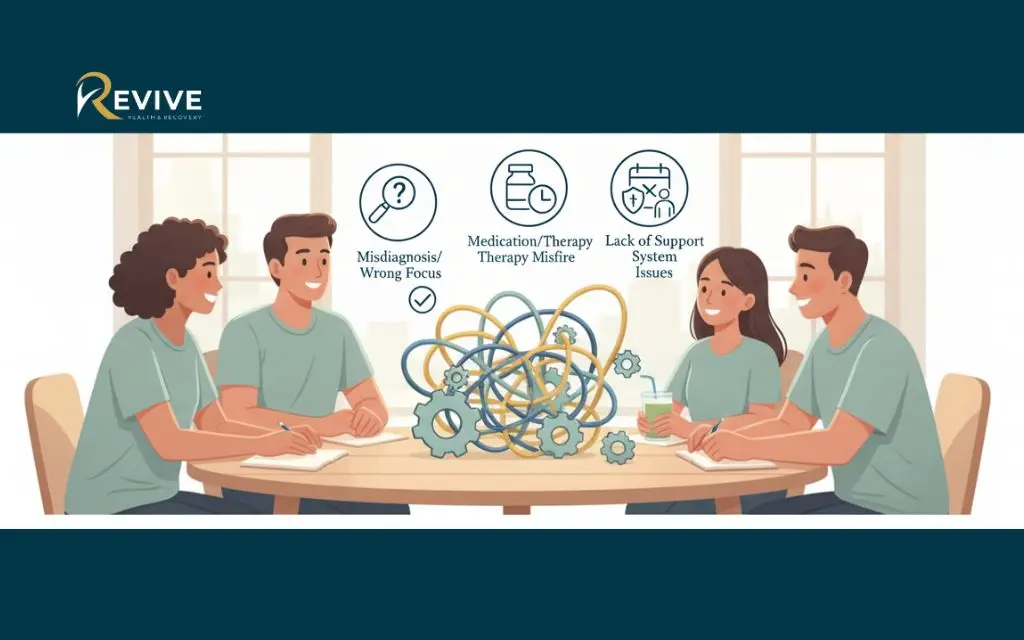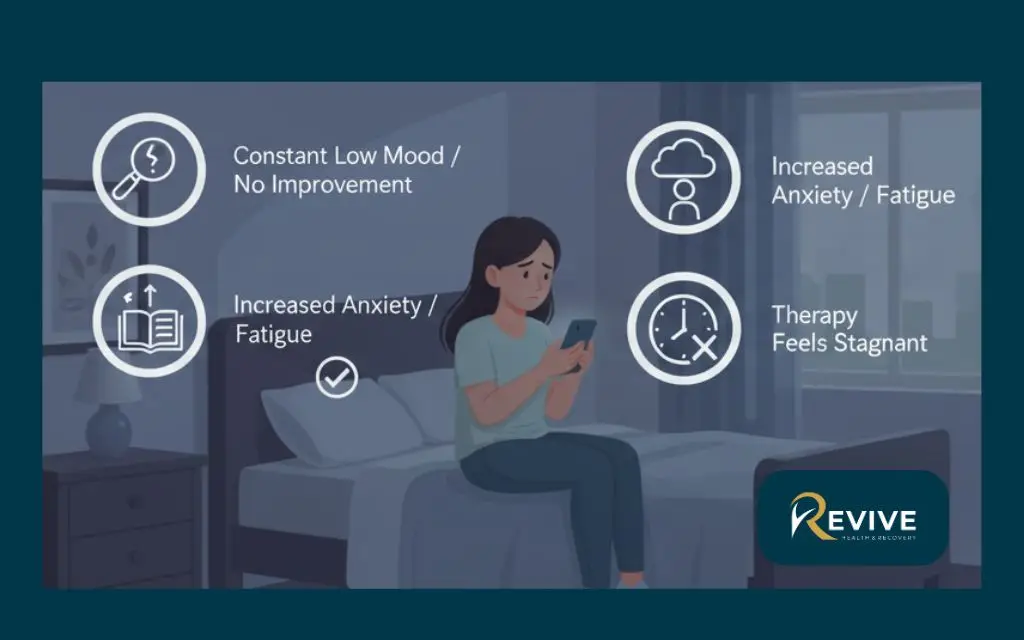Feeling defeated when mental health treatment isn’t delivering the relief you desperately need is more common than you might think. Research shows that 20-60% of psychiatric patients experience treatment resistance, and nearly one-third don’t return after their first therapy session. In Colorado, where we rank surprisingly low at #46 in mental health outcomes despite good access to care, this struggle hits close to home.
The truth is, treatment failure doesn’t mean you’re broken or that recovery is impossible. Often, it simply means you haven’t found the right approach, therapist, or combination of interventions yet. This comprehensive guide explores why traditional mental health treatment sometimes falls short and introduces evidence-based alternatives that thousands of Coloradans are using to reclaim their mental wellness.
If you’re questioning whether healing is possible, you’re in the right place. Let’s explore your options together.
Understanding why mental health treatment fails
The statistics behind treatment failure
When mental health treatment fails, you’re joining a larger group than most people realize. The numbers tell a sobering story about our current mental health system:
National dropout rates paint a concerning picture
Research indicates that 34% of clients don’t return after their first therapy session, while overall therapy dropout rates range from 19-46% across all treatment modalities. Even more striking, 50% of clients terminate therapy within the first two sessions.

Colorado’s unique mental health landscape presents its own challenges
Despite ranking #17 nationally for mental health workforce availability, Colorado falls to #46 for overall mental health outcomes. This paradox suggests that access alone doesn’t guarantee effective treatment. Denver reports that 1 in 8 residents experience poor mental health for 8 or more consecutive days, highlighting the gap between available services and successful outcomes.
The financial impact of treatment failure extends beyond emotional costs
Failed treatment attempts cost up to 10 times more than successful interventions when you factor in repeated attempts, crisis interventions, and long-term complications.
Common reasons for treatment resistance
Poor therapeutic alliance creates the biggest barrier to success.
The relationship between you and your therapist forms the foundation of effective treatment. When this connection feels forced or uncomfortable, progress stalls regardless of the therapist’s qualifications or the treatment method used.
Inadequate dual diagnosis treatment leaves many Coloradans underserved.
With 25.8% of adults with psychiatric disorders also struggling with substance use, the need for integrated treatment is critical. Yet only 18% of substance use programs can adequately treat dual diagnosis conditions, creating a significant treatment gap.
One-size-fits-all approaches ignore your unique needs.
Traditional therapy models often follow rigid protocols that don’t account for individual differences in trauma history, cultural background, or personal preferences for healing.
Unaddressed underlying conditions sabotage progress.
Sometimes what appears to be treatment-resistant depression or anxiety actually stems from undiagnosed medical conditions, nutritional deficiencies, or sleep disorders that need addressing first.
Are you experiencing any of these scenarios? If so, the problem isn’t with you. The problem lies in finding the right match between your needs and available treatment options.
Signs your current treatment isn’t working
Red flags to recognize
- Time becomes your most telling indicator. If you haven’t noticed meaningful improvement after 8-12 sessions of consistent therapy, it’s time to evaluate your current approach. While healing isn’t linear, complete stagnation suggests a mismatch.
- Your emotional state provides clear feedback. Feeling worse, more hopeless, or increasingly disconnected from your therapist signals that your current treatment path needs adjustment. Trust your instincts when something doesn’t feel right.
- The therapeutic relationship feels strained or superficial. You should feel heard, understood, and respected in therapy. If sessions feel mechanical, judgmental, or like you’re going through the motions, these therapeutic relationship problems indicate it’s time for change.
- Your complex needs get oversimplified. If your therapist seems to ignore parts of your story or reduces your struggles to simple explanations, you’re likely dealing with treatment-resistant conditions that require a more comprehensive approach.
Ready to take action? Contact Revive Health Recovery at (303) 268-4655 to discuss personalized treatment options that address your whole experience.

The dual diagnosis challenge in Colorado
- Colorado faces a significant dual diagnosis treatment gap. The state’s high prevalence of co-occurring mental health and substance use disorders (25.8%) far exceeds the capacity of specialized programs designed to treat both conditions simultaneously.
- Traditional treatment programs often fail dual diagnosis clients. Standard mental health therapy that doesn’t address substance use patterns, or addiction treatment that ignores underlying mental health conditions, leaves clients cycling through unsuccessful attempts at recovery.
- Integrated treatment approaches show promise. When programs address both mental health and substance use together, success rates improve dramatically. However, finding these specialized services in Colorado requires knowing where to look.
Rebuilding trust in mental health treatment
It’s not you, it’s the approach
- Treatment resistance differs from treatment failure. True treatment resistance affects only a small percentage of people. What most experience is actually a mismatch between their needs and the chosen intervention. This distinction matters because it means effective options likely exist for your situation.
- Finding the right therapeutic fit requires patience and advocacy. The therapeutic alliance accounts for up to 30% of treatment success. This means the person matters as much as the method. Don’t settle for a therapist who doesn’t understand your experience or cultural background.
- Comprehensive assessment reveals hidden factors. Many treatment failures stem from incomplete initial evaluations. Trauma history, medical conditions, social factors, and personal strengths all influence which interventions will work best for you.
Colorado’s mental health paradox
- High access doesn’t equal high success. Colorado’s ranking of #17 for mental health workforce availability versus #46 for outcomes reveals a system problem, not a patient problem. This means you may need to look beyond traditional options.
- Innovative approaches fill the gap. Colorado’s mental health paradox has created space for alternative and integrative treatment models that address the whole person rather than just symptoms.
- Community-based solutions show strong results. Many Coloradans find success through combinations of professional therapy, peer support, spiritual communities, and lifestyle interventions that aren’t typically offered in conventional treatment settings.
Evidence-based alternatives when traditional therapy fails
Holistic mental health approaches
Mind-body practices create measurable changes in brain function.
Yoga therapy, meditation, and breathwork aren’t just relaxation techniques. Research shows these practices can reduce symptoms of anxiety and depression as effectively as medication for some people.
The gut-brain connection influences mental health more than most realize.
Nutritional psychiatry examines how diet affects mood, anxiety, and cognitive function. Simple dietary changes sometimes resolve symptoms that medication couldn’t touch.
Sleep optimization addresses a root cause of many mental health struggles.
Circadian rhythm therapy and sleep hygiene improvements can dramatically impact mood disorders, especially when combined with other interventions.
Colorado’s outdoor culture offers unique therapeutic opportunities.
The state’s natural environment provides ideal settings for ecotherapy, adventure-based counseling, and mindfulness practices that complement traditional treatment.
Community-based healing
- Peer support networks provide understanding that professional therapy sometimes can’t. Connecting with others who’ve walked similar paths offers validation, hope, and practical strategies that textbook approaches often miss.
- Spiritual and faith-based counseling addresses meaning and purpose. For many people, mental health struggles involve questions about life’s meaning, forgiveness, and connection to something greater than themselves.
- Group therapy and community programs reduce isolation. Depression and anxiety thrive in isolation. Community-based interventions directly counter this by creating connections and shared experiences.
Integrative treatment models
- Combining traditional and alternative approaches maximizes your options. The most successful treatment plans often blend evidence-based therapy with complementary practices tailored to individual preferences and needs.
- Personalized treatment planning respects your unique situation. Instead of forcing you into predetermined protocols, integrative models adapt to your specific combination of symptoms, strengths, and life circumstances.
- Addressing root causes prevents recurring problems. Rather than just managing symptoms, comprehensive approaches identify and treat underlying factors that contribute to mental health challenges.
Wondering how to create your own integrative plan? Call Revive Health Recovery at (303) 268-4655 for a consultation about holistic approaches that complement your current treatment.
Creating your personalized recovery plan
Lifestyle interventions that work
- Exercise functions as medicine for mental health. Colorado’s outdoor culture makes this particularly accessible. Regular physical activity can be as effective as antidepressants for some people, with the added benefits of improved sleep, increased energy, and better self-esteem.
- Mindfulness and meditation practices rewire your brain. These aren’t just stress management tools. Consistent practice actually changes brain structure in areas related to emotional regulation, attention, and self-awareness.
- The nutrition and mental health connection affects daily mood and energy. What you eat influences neurotransmitter production, inflammation levels, and blood sugar stability. Small dietary changes can produce surprising improvements in mental clarity and emotional balance.

Building your support network
- Finding the right therapist requires knowing what to look for. The second time around, you have valuable information about what didn’t work. Use this knowledge to find someone who specializes in your specific challenges and shares your values about healing.
- Supportive communities provide ongoing encouragement. Recovery happens in relationship with others. Whether through support groups, spiritual communities, hobby groups, or volunteer work, connection combats the isolation that feeds mental health struggles.
- Family and friend involvement strengthens your foundation. When your inner circle understands your journey and knows how to help, your daily environment becomes therapeutic rather than stressful.
Mental health resources in Colorado
Holistic treatment centers
Colorado offers several facilities that integrate traditional therapy with alternative approaches. Revive Health Recovery leads this movement in Denver, combining evidence-based treatment with holistic practices like meditation, nutritional counseling, and community support.
Community support organizations
The state hosts numerous peer support networks, spiritual communities, and volunteer organizations that provide connection and purpose alongside professional treatment.
Alternative therapy providers
From acupuncture to art therapy, Colorado’s wellness community includes diverse practitioners who can complement your primary mental health treatment with specialized interventions.
FAQs about situation when mental health treatment fails
What percentage of people does therapy not work for?
Research indicates therapy doesn’t work for approximately 25% of people initially, but this often reflects a mismatch rather than true treatment resistance. At Revive Health Recovery, we help clients find the right therapeutic approach through comprehensive assessment and personalized treatment planning.
How do I know if I should switch therapists?
Consider switching if you haven’t seen improvement after 8-12 sessions, feel judged, or lack connection with your current therapist. Revive Health Recovery can help you evaluate your current treatment and explore alternatives that better fit your needs.
Are holistic approaches scientifically proven?
Yes, practices like yoga therapy, meditation, and nutritional interventions have substantial research backing their effectiveness for mental health. Revive Health Recovery combines these evidence-based holistic approaches with traditional therapy for comprehensive care.
Can medication and therapy alternatives be combined safely?
Absolutely. Many integrative approaches complement traditional treatment. Revive Health Recovery’s medical team coordinates with your existing providers to ensure safe, effective treatment combinations.
What makes dual diagnosis treatment so challenging?
Dual diagnosis requires specialized expertise, as mental health and substance use disorders interact complexly, requiring integrated treatment approaches. Revive Health Recovery specializes in dual diagnosis treatment, offering the comprehensive care needed for lasting recovery.
Why choose Revive Health Recovery for your healing journey
When traditional mental health treatment has let you down, Revive Health Recovery offers a different path forward. Our comprehensive, holistic approach addresses not just symptoms but the whole person – mind, body, and spirit.
Located in the heart of Denver at 1427 S Federal Blvd, we specialize in dual diagnosis treatment and integrative mental health approaches that have helped countless Coloradans rediscover hope and healing. Our evidence-based programs combine traditional therapeutic methods with innovative holistic practices including meditation, nutritional counseling, and community support.
Our team understands that when mental health treatment fails, it’s often because the approach wasn’t right for your unique needs. We take time to understand your full story, including what hasn’t worked before, to create a personalized treatment plan that addresses your specific challenges and builds on your strengths.
Your mental health journey continues here
Your mental health journey doesn’t end with treatment failure – it evolves. At Revive Health Recovery, we understand that healing isn’t one-size-fits-all, and we’re here to help you discover the combination of approaches that work for your unique situation.
Every person deserves access to mental health treatment that honors their individual needs and circumstances. If traditional therapy has left you feeling discouraged, remember that alternative and integrative approaches offer new possibilities for healing and growth.
Ready to explore a new path to mental wellness? Contact Revive Health Recovery today:
- Call us 24/7: (303) 268-4655
- Email: contact@revivehealthrecovery.com
- Visit us: 1427 S Federal Blvd, Denver, CO 80219
Don’t let treatment failure define your story. Let us help you write the next chapter of your recovery journey with hope, evidence-based care, and the holistic support you deserve. Your healing is possible, and we’re here to help you find the path that works for you.



